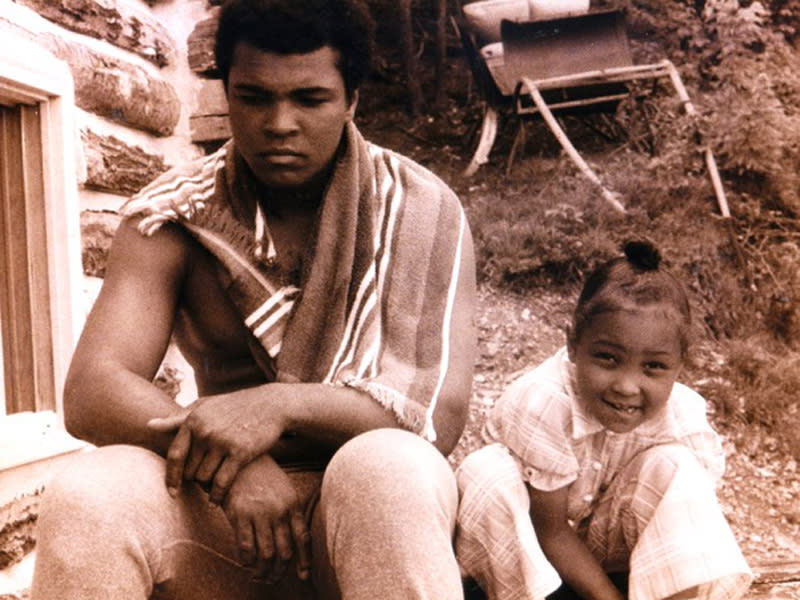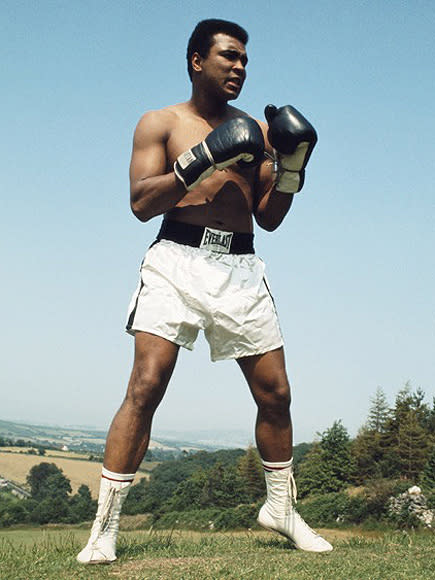Muhammad Ali's Eldest Daughter Shares Memories of Her Dad and Hope for Those With Parkinson's: 'Attitude Is Everything'
At the 74th birthday party of legendary boxer Muhammad Ali in January, his family asked a magician to come to his house to perform for the lifelong lover of magic tricks. Ali also rode a recumbent stationary bicycle for about 30 minutes, another joy-inducing activity.
"Being engaged in what makes you happy is so important," says the oldest of the fighter's nine children, Maryum "May May" Ali. "Attitude is everything."
Good advice for all, but particularly for sufferers of Parkinson's disease, which her father gallantly battled for the last three decades before his June 3 death. Ali, 48, was close to her father, and has long participated in his care, with regular visits from her Los Angeles home to her father's house in Arizona.
A photo posted by Hana Ali (@hanayali) on Jan 16, 2016 at 7:15pm PST
"The biggest thing is to be proactive," says Ali, a social worker focused on gang prevention. "The entire family should understand this disease. Once my father began to understand his disease and the family did as well, everyone was happier. This diagnosis doesn't mean your life is over."
A photo posted by Hana Ali (@hanayali) on Jan 16, 2016 at 7:25pm PST
At the upcoming opening ceremonies of the 4th World Parkinson Congress on Sept. 20-23 in Portland, Oregon, Ali will share memories of her father, and insights she's learned as "a child with someone with Parkinson's," she says.
The event, which won't be back in the U.S. for another 9 years, gathers together an international crowd of researchers, healthcare providers, family members, and those afflicted with the disease for an exchange of the latest information and advice.

"It's a great opportunity to learn what the research is," she says. "I wish my dad had this the first year he had [Parkinson's]. We had to learn by trial and error. I know how critical it is to understand the disease, it can be life changing. There are so many unknowns and it's priceless to learn."
For more information on the congress, and how to attend, go towpc2016.org.
Ali recalls a change in her father before his 1984 diagnosis: slowed movement and softer speech. "His voice became softer where you couldn't understand him," she says. "We thought it was from the boxing and then his balance was off and we thought, 'Boxing has really impacted him.' "
Ali says that when her father first went to doctors, "they said because he was a boxer he had Parkinson's syndrome and it wouldn't get worse. There weren't many incidents of young people with Parkinson's, many of the top people thought that. And no other boxers had it."

Boxing alone most likely didn't cause her father's Parkinson's, Ali says, but a combination of boxing and her dad's exposure to other risk factors: pesticides while at his boxing training camp in Deer Lake, Pennsylvania. "I think boxing could have triggered what was there," she says.
As a longtime caregiver, Ali learned over the years the importance of open communication with doctors, a positive family support system, and providing a low stress environment for her dad. Or that when his walking became more rigid, "if you tap your foot on top of his foot it would unfreeze."

Also, she and family members realized that just because the legendary boxer known for his loquacious banter didn't talk much, it didn't mean he wasn't listening.
"We were being engaged as if he doesn't have it," Ali says. "Treat him like he's regular, be regular with him, it lifts the spirits up."
Ali says that side effects of certain medications caused her father to have some compulsive behaviors, which included an urge to look at books "constantly."
"And since it's not a behavior that's harmful, we'd bring him books," she says. "He used to love scenic books with beautiful landscapes. He also loved the books about himself, we'd read to him and we'd read the Holy Koran."
Her father also loved Westerns, which he'd watch "all day long," she says.
Ali was with her father when he died at a Phoenix-area hospital on June 3. Since his passing, she says she's been "holding up fine" and most misses her father's energy.
"My father had a very good energy," she says, "he was angelic in his energy and spirit."

